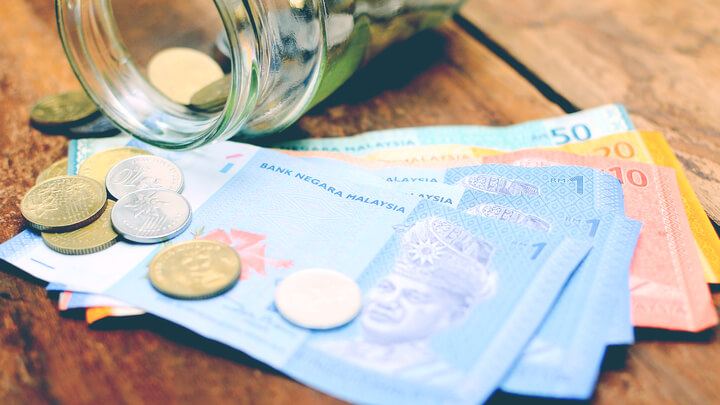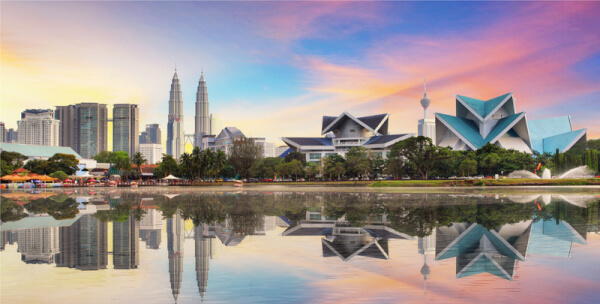Is it better to use cash or card in Malaysia?
Should you pay with cash or card in Malaysia? A handy guide including cash etiquette, Malaysian ATMs and using your UK card.

Drawing over 27 million people annually, Malaysia has long been a popular tourist destination for regional travellers. Most come for short stays to experience the vibrant city life, or to switch off for a while at one of its beautiful beaches. However, with its flourishing tech and start-up scene, Kuala Lumpur is fast becoming a hot ticket for entrepreneurs and those looking to settle for the longer term.
Whether you’re headed for the beach or the boardroom, you’re going to need some cash in your pocket for your stay.
This quick guide walks through Malaysia’s currency and banking systems so you’ll know what to expect.
The Malaysian currency is called the Ringgit.
| --- | --- |
| Ringgit Symbols | MYR (in currency exchange), RM (to express prices) |
| 1 MYR | Each Ringgit is divided into 100 Sen. |
| MYR coins | Malaysian coins come in 5, 10, 20 and 50 Sen denominations in a variety of different materials and finishes. |
| MYR banknotes | Banknotes are available in denominations of 1, 5, 10, 20, 50 and 100 Ringgits. The smaller value notes (RM1 and RM5) are polymer while the other notes are paper printed. There are several different series’ of banknotes in circulation, although older ones are more rare. They’re all legal, but some merchants might refuse the very old notes, especially if they show some damage. |
Other currencies aren’t widely accepted in Malaysia, so you’ll need to exchange some cash to get you through.
The Ringgit can not legally be traded outside of Malaysia, so you’ll need to exchange some cash when you arrive. Some exchange bureaus have found ways around this rule, so you may be offered currency exchange at home - but the rates won’t be as good as those available once you arrive.
Currency exchange in Malaysia is fairly easy. You can change your cash at a bank, with a money changer, or at a currency exchange desk - at a hotel or the airport, for example. As a general rule, it costs more to switch currency at a bank or currency exchange desk, and airports and hotels tend to have even higher fees.
If you need to change larger sums, using a money changer in town is the best way to get a good deal. Steep competition in town means you will get a better exchange rate than those offered in airports or hotels.
If you’re in need of cash in a hurry, your best option may be to use an ATM to withdraw what you need.
Naturally, when you choose an exchange service, you’ll need to watch out for hidden fees. Even if a service claims ‘Zero Commission’, they’ll simply add their profit into the poorer exchange rate they offer you.
Choose the best deal by making sure you understand the mid market rate. The mid market rate is the real exchange rate, and by comparing it with the offered tourist exchange rates, you can see the profit margin that the exchange service has added.
Find out the mid market rate by using a currency converter online so you can decide whether or not the deal you’re offered is fair.
If you’re exchanging cash, make sure the notes you have are in good condition. Torn or damaged notes might be refused by money changers.
Traveller's Cheques can’t usually be used in Malaysia as a form of direct payment. Banks and exchange services may cash the Cheques for you, but there will be a fee for each Cheque they change.
If you’re carrying Traveller’s Cheques with you, make sure you look carefully at the exchange rates and fees applied. Often, the combination means that you’re worse off than if you were using cash or spending on a card. Add in the inconvenience of needing to find an exchange bureau who can deal with Cheques, and many travellers decide to avoid them altogether.
Smaller traders and stores don’t accept debit/credit card payments in Malaysia - but you should have no problems with large, established businesses in tourist areas. All the major card providers are accepted, but make sure you have some cash on you too, just in case of any issue.
Many financial institutions will have Malaysia on their ‘watch list’ for suspect activity. This means it is crucial to tell your card provider in advance that you’re travelling there so that your card isn’t blocked. It only takes a minute or two to call your bank and it can help avoid an embarrassing and awkward situation later.
Spending on credit or debit cards is a convenient option for many travellers - especially for larger purchases or hotel bills. However, because you’re using a foreign card, you might find that you’re asked if you want to be charged in your home currency.
Being charged in your home currency is something called Dynamic Currency Conversion (DCC). It lets you see the cost of the transaction listed in your home currency when you pay. Though it’s described as a “service”, DCC isn’t a great idea. It leaves you exposed to hidden fees with a poorer exchange rate assigned by the local bank. Always opt to pay in the local currency (MYR) instead - that way, your home bank (who wants to keep you as their customer) will assign a much better exchange rate.
Finally, apply sensible precautions when using a card in Malaysia. Tourists are easy targets for scams, so don’t let your card out of your sight. If you have any doubts, use the ATM finder in the next section to withdraw cash and pay that way.
ATMs are common in Malaysia and can be found in banks, shopping malls and transport hubs. You can find one easily using one of the locator tools below.
Visa ATM locator
MasterCard ATM locator
Amex ATM locator
When you use an ATM, your home bank will apply a fee for overseas withdrawal. You may also find that the Malaysian ATM adds its own fee. Ask your home bank before you leave what charges will be added - and watch the notices on the ATM to understand any additional fees.
Usually, despite the fees, using an ATM is a convenient and reasonable value way of getting cash abroad, as long as you avoid DCC.
DCC (described in the previous section), is when you’re charged for the withdrawal in your home currency. However, this means that the exchange rate applied is selected by the Malaysian ATM provider - it’s almost always a poor deal. While your home bank has an interest in keeping you, an ATM provider will be very happy to take your hard-earned cash.
Always select to be charged in local currency when withdrawing money abroad to access the rate set by your home bank.
The major Malaysian banks (which are listed below) have excellent branch and ATM coverage throughout the country. They also operate more broadly throughout the Asia-Pacific region.
It is well worth seeing if your home bank works in partnership with any Malaysian banks. If they do, you might be able to use their ATMs for free during your travels.
These are the most common retail banks in Malaysia along with a list of several major foreign banks that have a presence there:
If you’re looking for simple access to your money abroad - and an even better deal - you can always use Wise.
If you have a bank account in Malaysia, or know someone who does, you can transfer money between countries using the real mid market exchange rate. There’s no need to scour the city looking for the best rate - making it a convenient way to get your cash, with no hidden fees.
*Please see terms of use and product availability for your region or visit Wise fees and pricing for the most up to date pricing and fee information.
This publication is provided for general information purposes and does not constitute legal, tax or other professional advice from Wise Payments Limited or its subsidiaries and its affiliates, and it is not intended as a substitute for obtaining advice from a financial advisor or any other professional.
We make no representations, warranties or guarantees, whether expressed or implied, that the content in the publication is accurate, complete or up to date.

Should you pay with cash or card in Malaysia? A handy guide including cash etiquette, Malaysian ATMs and using your UK card.

If you’re planning to travel to Malaysia, you may be wondering where to get cash for your trip. Malaysian currency - the Ringgit - isn’t as readily available...